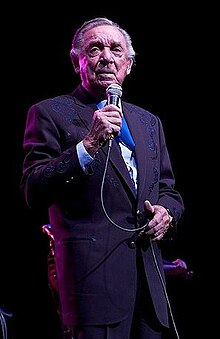Uploaded on Oct 17, 2011
From the 1967 album "Touch My Heart"
Ray Price (born January 12, 1926) is an American country music
singer, songwriter and guitarist. His wide-ranging baritone has often
been praised as among the best male voices of country music.
Some of his
well-known recordings include "Release Me", "Crazy Arms", "Heartaches by the Number", "For the Good Times", "Night Life", and "You're the Best Thing That Ever Happened to Me". He was elected to the Country Music Hall of Fame in 1996 and—now in his late 80s—continues to record and tour.
| Ray Price | |
|---|---|
 |
|
| Background information | |
| Birth name | Ray Price |
| Also known as | The Cherokee Cowboy |
| Born | January 12, 1926 |
| Origin | Perryville, Texas, U.S. |
| Genres | Country, Western swing |
| Occupations | Singer, songwriter, guitarist |
| Years active | 1948–present |
| Associated acts | Johnny Bush, Merle Haggard, Rosetta Tharpe, Harlan Howard, George Jones, Roger Miller, Willie Nelson, Johnny Paycheck |
Biography
1940s–50s success
Price, born in Perryville, Texas, served with the U.S. Marines from 1944–1946, and began singing for KRBC in Abilene, Texas during 1948.He joined the Big D Jamboree in Dallas in 1949. He relocated to Nashville in the early 1950s, rooming for a brief time with Hank Williams.
When Williams died, Price managed his band, the Drifting Cowboys, and had minor success. He was the first artist to have a success with the song "Release Me" (1954), a top five popular music hit for Engelbert Humperdinck in 1967.
In 1953, Price formed his band, the Cherokee Cowboys. Among its members during the late 1950s and early 1960s were Roger Miller, Willie Nelson, Darrell McCall, Van Howard, Johnny Paycheck and Johnny Bush. Miller wrote one of Ray Price's classics in 1958, "Invitation to the Blues", and sang harmony on the recording. Additionally, Nelson composed the Ray Price song "Night Life".
Price became one of the stalwarts of 1950s honky tonk music, with hit songs such as "Talk To Your Heart" (1952) and "Release Me". He later developed the famous "Ray Price Shuffle," a 4/4 arrangement of honky tonk music with a walking bassline, which can be heard on "Crazy Arms" (1956) and many of his other recordings from the late 1950s.
1960–2000s: Nashville sound to gospel
During the 1960s, Ray experimented increasingly with the so-called Nashville sound, singing slow ballads and utilizing lush arrangements of strings and backing singers. Examples include his 1967 rendition of "Danny Boy", and "For the Good Times" in 1970 which was Price's first country music chart No. 1 hit since "The Same Old Me" in 1959.Written by Kris Kristofferson, the song also scored No. 11 on the popular music chart and featured a mellower Price backed by sophisticated musical sounds, quite in contrast to the honky tonk sounds Price had pioneered two decades before.
Price had three more No. 1 country music successes during the 1970s: "I Won't Mention It Again", "She's Got To Be A Saint", and "You're the Best Thing That Ever Happened To Me." His final top ten hit was "Diamonds In The Stars" in early 1982.
Price continued to have songs on the country music chart through 1989. Today he is singing gospel music and has recorded such songs as "Amazing Grace", "What A Friend We Have In Jesus", "Farther Along" and "Rock of Ages" [1].
In 2006, Price was living near Mount Pleasant, Texas and still performing in concerts throughout the country. In 2009, Price made two performances for the Fox News show Huckabee.
The first was with the Cherokee Cowboys and host Mike Huckabee, and he performed "Crazy Arms" and "Heartaches By The Number". Weeks later he performed with the Cherokee Cowboys and Willie Nelson (again with Huckabee playing bass guitar).
This time they performed duets of "Faded Love" and "Crazy".
Price worked on his latest album, Last of the Breed, with fellow country music singers Willie Nelson and Merle Haggard.
This album was released on March 20, 2007 by the company Lost Highway Records. The two-disc set features 20 country classics as well as a pair of new compositions. The trio toured the U.S. from March 9 until March 25 starting in Arizona and finishing in Illinois. This was Price's third album with Nelson and first album with Haggard.
Cancer
On November 6, 2012 Ray Price confirmed that he is fighting pancreatic cancer. Price told the San Antonio Express-News that he has been receiving chemotherapy for the past six months.[1]An alternative to the chemo would have been surgery that involved removing the pancreas along with portions of the stomach and liver, which would have meant a long recovery and stay in a nursing home.
Said Price "Thats not very much an option for me. God knows I want to live as long as I can but I don't want to live like that."[1]
The 86-year old Country Music Hall of Famer also told the newspaper "The doctor said that every man will get cancer if he lives to be old enough. I don't know why I got it -- I ain't old!"[1]
Price has retained a positive outlook and hopes to play as many as a hundred concert dates in 2013.
Source: Wikipedia
TTFN
CYA Later Taters
Thanks for watching.
Donnie/ Sinbad the Sailor Man

